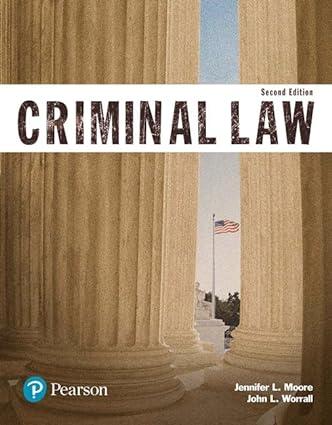The parties, by and large, do not dispute the material facts. The Defendant, Phuong Le, is a
Question:
The parties, by and large, do not dispute the material facts. The Defendant, Phuong Le, is a 49-year-old who lived in Vietnam until 1991 . . . Le and his family, including his first wife, moved to the United States in 1998, when they were granted refugee status . . . During several trips to Vietnam throughout the period of 2004 to 2007, the Defendant met and married his current wife, My Nga Ly.
Ms. Ly applied for a visa to visit the United States, but her application was denied . . . Upset by this news, Le sent a letter to Congressman Scott that made references to the Virginia Tech shootings of 2007, threatened to decapitate Bennett, and indicated that Le planned to commit suicide.
The letter was also smeared with Le’s blood. Le states that his letter was not intended to threaten, but rather to insult, and somewhat belatedly, has blamed his lack of understanding of English language and a difference in cultures for the misunderstanding. Le was charged with a violation of 18 U.S.C. § 876, Mailing Threatening Communications . . . Le argues that, because he was linguistically and culturally incapable of understanding that his communication was threatening, he could not have possessed the required mens rea. Le proffers expert testimony to support his factual claims. The United States argues that no mens rea requirement is attached to the “threat” element of § 876. [Le is seeking to withdraw his original guilty plea.]
The relevant statute provides: [w]hoever knowingly . . . deposits or causes to be delivered . . . any communication with or without a name or designating mark subscribed thereto, addressed to any other person and containing any threat to kidnap any person or any threat to injure the person of the addressee or of another is guilty of a crime.
18 U.S.C. § 876 . . . Le has not argued that he did not knowingly place that communication in the mail. Therefore, the remaining question in assessing whether there is a credible showing of innocence is his mental state respecting the threat contained in the letter which he admittedly sent.
. . . Dr. Leung, Le’s expert, offers conclusions about the subjective meanings of Le’s words as they were communicated in the letter . . . Amidst a flurry of conclusions of questionable relevance and admissibility, Dr. Leung makes three salient statements. First, Dr. Leung states that the phrase “cut his head off,” as idiomatically used in Vietnamese, expresses an insult rather than an actual threat. Second, Dr. Leung states that Le’s act of smearing the letter with blood is a Vietnamese tradition called “letting blood,” which has the effect of vouching for the truthfulness of the content of the document. These points support Le’s argument that he had no general intent to threaten and/or knowledge that his letter contained a threat and, thereby, they support Le’s claim of actual innocence.
Questions:
1. Do you think a defendant’s cultural background should be relevant in determining guilt or innocence?
2. What did the court ultimately rule in regards to Le’s motion?
Step by Step Answer:






